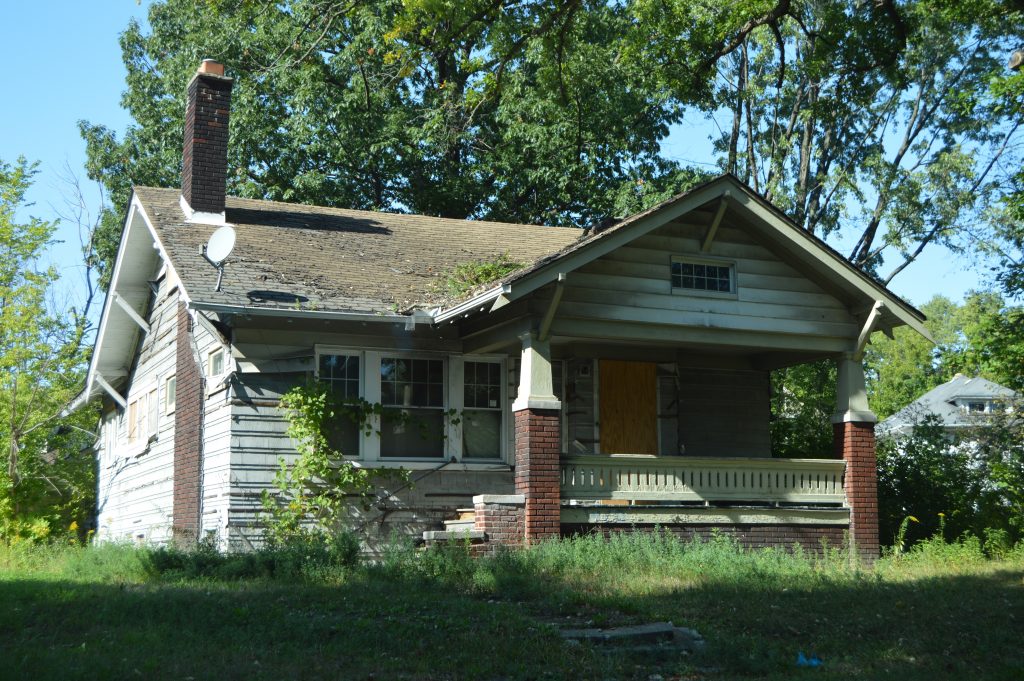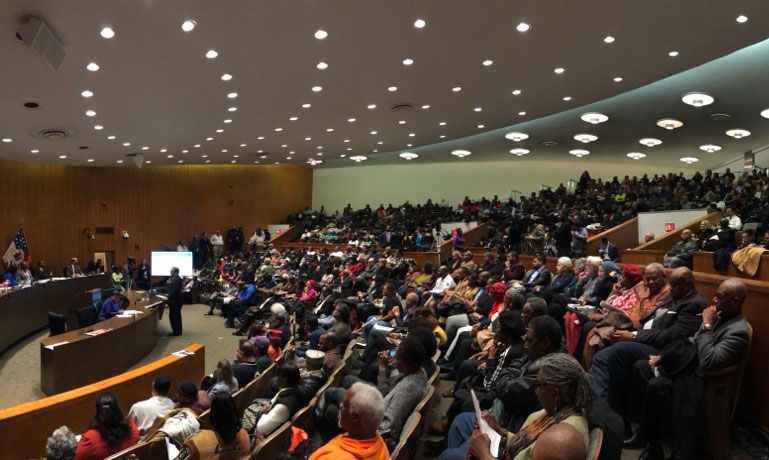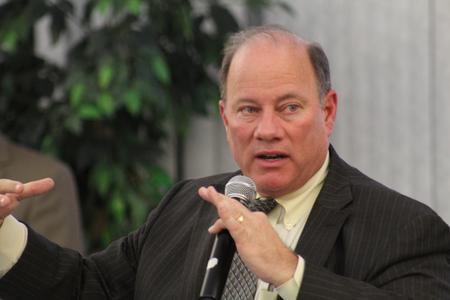Detroit City Council Rejects Duggan’s Blight Bond Proposal. Now What?
Council members have the ability to change their vote before their last meeting of the year next week.

Detroit City Council voted down a proposal to add a $250-million blight bond question to the March primary ballot.
The move is a defeat for Mayor Mike Duggan, who had lobbied for voters and council to approve the sale, which would extend funding for Detroit’s demolition program. Hundreds of residents expressed concerns about bringing the issue to the ballot in the weeks leading up to the vote, citing lack of transparency in the demolition program among concerns of how city funds were being used.
The few that spoke in support of the program claimed demolitions would help beautify the city and lower crime in neighborhoods.
Final City Council vote on blight bond proposal
For: Council members Gabe Leland, Scott Benson and Janeé Ayers
Against: Council President Brenda Jones, President Pro Tem Mary Sheffield, Council members Roy McCallister, Andre Spivey, James Tate and Raquel Castañeda-López

One Week to Change Vote
But the vote does not signal the end to the debate.
“I will wait until next Tuesday before it’s officially dead,” Sheffield says. “Because after next Tuesday you can’t reconsider your vote anymore.” Council members can request a waiver to change their vote before a long winter break in sessions.
Other council members are optimistic about putting a version of the question on a later ballot.
“We will bring it to the people in March,” Spivey says. He supported the proposal but voted against the resolution. “We will come back in June to actually approve going out to the market and getting the funds.”
“There was another perspective that was equally legitimate.” – Mayor Mike Duggan after the vote

A Months-Long Campaign
The decision marks an end to a months-long campaign by the mayor’s office to support the plan.
“I felt confident that if this was on the March ballot, we would be able to show the voters in December, in January, in February we had the controls in place,” Duggan told reporters following the vote. “But there was another perspective that was equally legitimate.”
Detroit City Council held a special public hearing on the matter the previous night. At the beginning of the meeting, Council President Brenda Jones remarked that she had received multiple telemarketer calls to her office to vote “Yes” on the issue. “Intimidation gets you no place on this council,” Jones said. Representatives for the Duggan administration say the calls are not being funded by the mayoral office or affiliated campaigns.
“I couldn’t in good conscience recommend to the council to vote on it to put it on the ballot.” – Thomas Wilson, resident
Detroit’s Chief Financial Officer Dave Masseron spoke on the budget implications for the bond proposal and how the sale would keep demolitions at its current pace by removing 19,000 blighted homes from the city by 2025.
City fiscal analyst Irvin Corley told the council that if blight bond proposal fails to pass, the average Detroit homeowner would save $60 a year from their property tax bill. Detroit properties currently have a 9-mil tax for the city’s debt obligations. Corley estimates the rate would drop to 6-mil without the bond.
Detroiters shared their comments on the blight bond at the evening hearing. Long-time resident Thomas Wilson says while he supports removing blight, recent reports have cast doubt on how the program runs.
“I couldn’t in good conscience recommend to the council to vote on it to put it on the ballot,” Wilson says. “Nor would I at this particular time vote for it.”
Transparency Issues Behind Blight Buster Program
Detroit’s Auditor General published a scathing report on city demolitions in the weeks leading up the vote. The audit points to many flaws in the program stemming from poor records-keeping by associated agencies.
“They need to be more transparent in what they’re doing,” Detroit’s Auditor General Mark Lockridge told WDET for a story published earlier this week. “That was the difficult part of our audit, was that we couldn’t get information in a timely fashion.”
Members of the Charlevoix Village Association on Detroit’s east side were in attendance Monday night and passed out flyers against the proposal. Toyia Watts, a member of the neighborhood group, says the Duggan administration mishandled previous funding and the money would be better spent on foreclosure prevention.
“You can tear down houses, and that will help improve communities, but you cannot revive the city of Detroit through empty lots!” – Derek Hollaway, Detroit People’s Platform
“They overcharged the people that were living here in Detroit, and that’s how so many people lost their homes,” Watts says. “They couldn’t afford it. So that’s what I’m looking at.”
Residents associated with the Detroit’s Peoples Platform were in attendance.
The grassroots activist organization supports affordable housing and community benefits in Detroit. Member Derek Hollaway, who lives on Detroit’s west side, is not convinced that the sale is worth the 30-year debt obligation.
“Chances are, at this point in time, we’re not going to be able to pay all of it, and it may take longer,” Hollaway says. “You can tear down houses, and that will help improve communities, but you cannot revive the city of Detroit through empty lots!”
Detroit has $50-million dollars set aside every year for demolitions, as forecast in the post-bankruptcy Plan of Adjustment.
Support the news you love.
Here at WDET, we strive to make our journalism accessible to everyone. As a public media institution, we maintain our journalistic integrity through independent support from readers like you. If you value WDET as your source of news, music, and conversation, please consider making a gift today. Even $5 a month helps!
